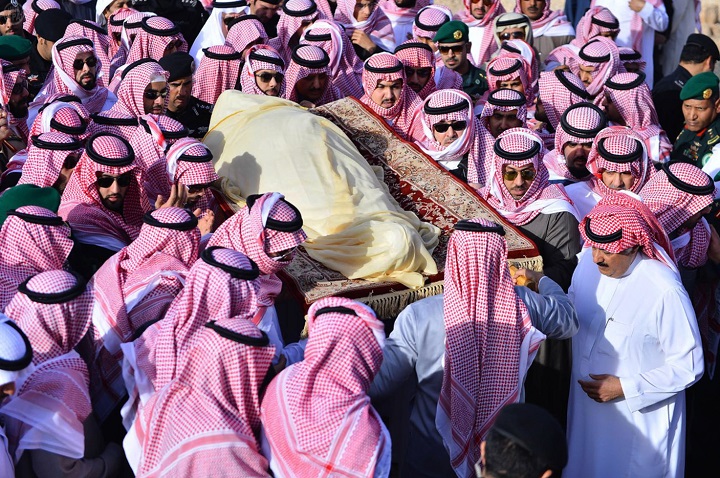RIYADH, Saudi Arabia – World leaders and top dignitaries began arriving in Saudi Arabia on Saturday to give their condolences following the death of King Abdullah, who died early Friday at age 90 after nearly two decades at the helm.

Despite deep tensions and rivalries between the nations, Iran’s Foreign Minister Mohammad Javad Zarif was among the first to arrive to the Sunni-ruled kingdom on Saturday where he was greeted at the airport by the late king’s son, Prince Turki, who is governor of Riyadh. Saudi state TV showed Zarif walking with the prince down a red carpet on the tarmac.
The newly enthroned King Salman is also expected to receive in the coming days U.S. President Barack Obama, Egyptian President Abdel-Fattah el-Sissi, Japan’s Crown Prince Naruhito, Spain’s King Felipe VI, Jordan’s King Abdullah, Denmark’s Crown Prince Frederik, Dutch King Willem-Alexander, and the United Kingdom’s Prince Charles. Morocco’s Prince Moulay Rachid will pay his respects on the behalf of his brother King Mohammed VI.
Talk of Zarif visiting Saudi Arabia last year quickly dissipated after Iran protested comments made by Saudi Arabia’s Foreign Minister Saud al-Faisal in which he called on Tehran to withdraw its “occupying forces” from Syria, Yemen and Iraq. Iran insists it has no combat forces on the ground in any of the three countries, though it says it has sent senior commanders as advisers to Syria and Iraq.

Get daily National news
The diplomatic squabble, in many ways, exemplified how Abdullah’s most pressing priority was to confront the Shiite powerhouse across the Gulf. The multiple conflicts across the region deepened Sunni-Shiite hatreds and fueled militancy during his reign.
The king, who ascended to the throne in 2005 but had been de-facto ruler for a decade before that, was buried Friday afternoon in an unmarked grave after a prayer service in the capital Riyadh. The Muslim-only funeral was attended by Turkish President Tayyip Erdogan and the rulers of Qatar, Kuwait and Bahrain.
In line with the Wahhabi interpretation of Islamic tradition observed in the kingdom, he was buried in an unadorned, beige cloth without a coffin in an unmarked grave. There was no memorial service.
Heads of state and royals from around world will instead be visiting Saudi Arabia over the coming days to pay their respects in meetings with Saudi royals. Powerful heads of tribes, as well as average Saudi citizens, will also meet the new king to give their condolences and express pledges of loyalty to him.
The visits are taking place in the king’s dewaniya in Riyadh, a traditional Arab reception area to receive guests.
Delegations from China and South Korea, as well as prime ministers and senior politicians from Europe, Asia and elsewhere were expected in Saudi Arabia. The presidents of Mauritania, Senegal and Gabon were shown on Saudi state TV arriving on Saturday.
Friday evening, the kingdom’s senior cleric, Grand Mufti Sheikh Abdul-Aziz Al-Sheikh, government ministers, senior military leaders and other Saudi officials met with Salman, as well as his Crown Prince Muqrin and Deputy Crown Prince Mohammed bin Nayef, who is also interior minister, to swear their allegiance.
Al-Sheikh said in comments carried on national television that he advises the king to “fear God in private and in public” and to work with sincerity. He praised the handing over of power as a “legitimate transition”, essentially giving the Al Saud family the influential religious establishment’s continued blessing and support.
—
Batrawy contributed from Dubai, United Arab Emirates.





Comments